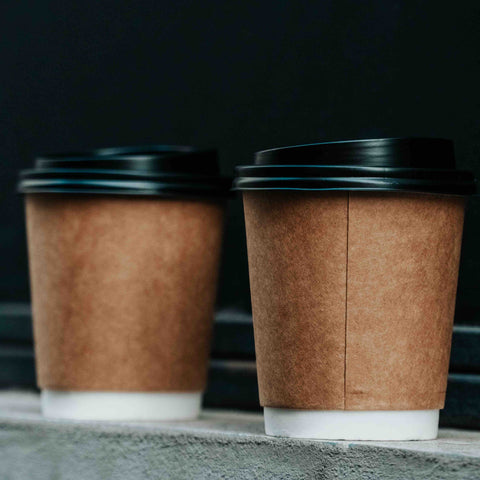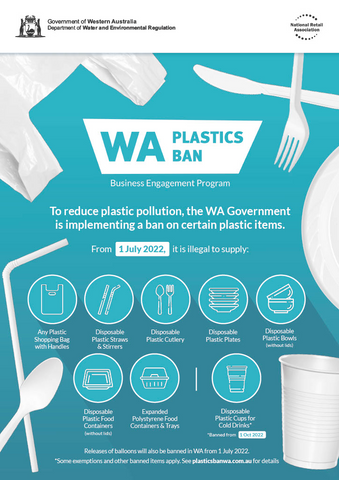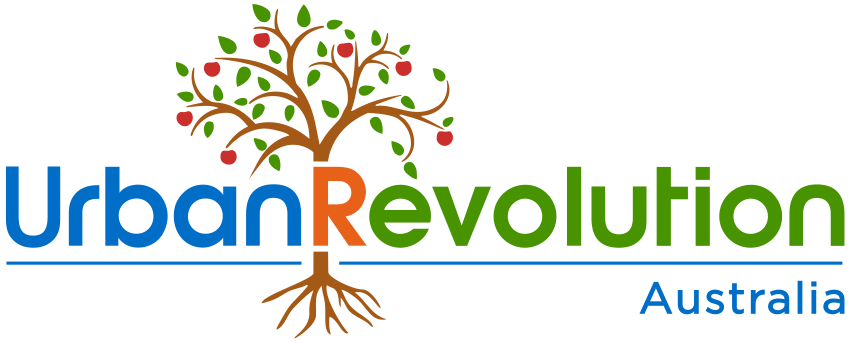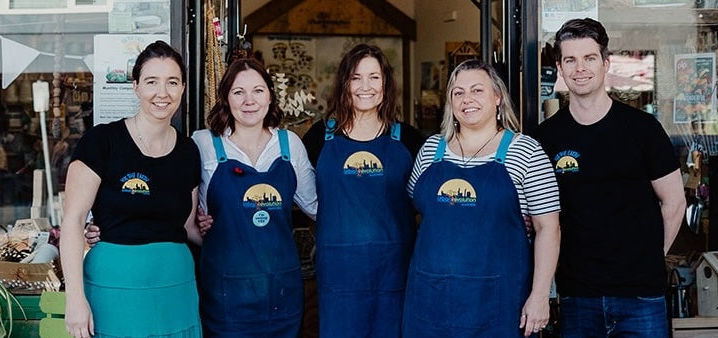Western Australia is entering the next phase of the Plan for Plastics with the enforcement of bans on a range of single use plastic items rolling out from February 2023.
A further nine single-use plastic items are being phased out from 27 February:
- Non compostable plastic takeaway coffee cups
- Plastic produce bags
- Cotton buds with plastic stems
- Expanded polystyrene packaging
- Expanded polystyrene cups
- Microbeads
- Degradable plastics
- Unlidded trays
- Lids for takeaway bowls, plates, cups, trays and containers
The WA Government is allowing a transition period for businesses to use up supplies and source alternative products before the bans are fully enforced between September 2023 and July 2025.

Certified compostable coffee cups and other plastic free single use alternatives will continue to be available.

WA Plan for Plastics Started in 2022
Western Australia's Plan for Plastics has been fast-tracked by four years and the enforcement of a ban on some of the most problematic single use plastics started on 1 July 2022.
The extent of plastic pollution occurring in terrestrial and marine environments has become a serious problem recognised at an international level. There is now a substantial body of evidence about the impact that plastic is having on the environment.
This ban cannot come soon enough - five years ago the information gathered by Clean Up Australia through its annual clean up days, showed that Western Australia had one of the highest levels of plastic pollution in the country, particularly along the Perth coast.

WA Single Use Plastic Ban
In 2022, the WA Government legislated that all these single-use plastic items must be phased out:
- Plastic bowls
- Plastic cups
- Plastic plates
- Plastic cutlery
- Plastic stirrers
- Plastic straws
- Polystyrene food containers
- Thick plastic shopping bags (the 15c ones)
- Helium balloon releases

Helium balloon releases are included in the new WA single use plastic ban

In 2021, WA was rated as the leading state in Australia for action on single-use plastics by WWF Australia, and these new rulings will mean that WA remains a leader in this space. Western Australians showed strong support for the Plan for Plastics, with more than 98 per cent of those surveyed saying they supported further action on single-use plastics.
Stage 1 of the WA Plan for Plastics saves 430 million single-use plastics from landfill or litter in WA each year. Stage 2 will save an additional 700 million items annually.
As each phase is rolled out, the initial focus will be on education and support for businesses for the first six months after each stage, rather than compliance. The Plastic Free Places Program will help community organisations and businesses to adapt to becoming more sustainable.
More than 9,000 retailers, suppliers and community groups received support during Stage 1 through the National Retail Association. The Boomerang Alliance, in partnership with the State Government, is continuing to help the hospitality industry adapt over three years through the WA Plastic Free Places program.
Local Support for Plastic Free Places in Town of Victoria Park
The Town of Victoria Park successfully trialled a Plastic Free Places program in 2020
We know that this move will be well supported in our local council area of Town of Victoria Park. In 2017, a survey was conducted in the town to establish a position on the possibility of a ban on all plastic bags. 170 people responded to the survey. Amongst respondents there was support for the plastic bag ban, with 158 voting "Yes", 14 voting "No".
The WA single-use plastic bans will build on the lightweight plastic bag ban implemented in 2018, and the Containers for Change container deposit scheme, which has seen 358 million beverage containers recycled and more than $1.46 million donated to charities and community groups since October 2020.
Under the National Plastics Plan,the Commonwealth Government also committed to phase out loose fill and moulded polystyrene packaging by July 2022, as well as expanded polystyrene foodware, oxo-degradable plastics, and PVC packaging labels by December 2022.






Leave a comment (all fields required)